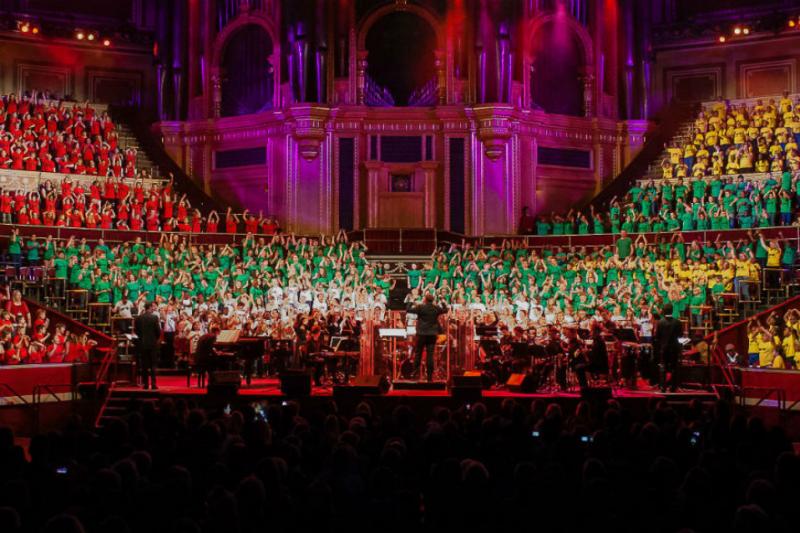Opinion: Cuts to music education are a positive step | reviews, news & interviews
Opinion: Cuts to music education are a positive step
Opinion: Cuts to music education are a positive step
The founder of a choral academy argues that music education is due for an overhaul

“Without music, life would be a mistake”: Nietzsche. Sadly for many – indeed tragically, Nietzsche would say – music education in the UK has become so inconsistent that now, music barely features in some children’s lives at all. For years, county music services have been tied in to long contracts with services and teachers, some of whom have consistently delivered outstanding musical education, while others are tired and disconnected from the needs of the pupils they are teaching.
The government has received a public bashing for the recent cuts to music education and county music services, but I believe that these changes are the most positive thing to happen to music education in years. The conditions of new funding mean that county music services must work with regional professional partners, forcing new collaborations which are benefiting both the UK’s schoolchildren and the arts organisations who are now dedicating their time to providing first-rate music education.
Cuts are a good excuse to evaluate and improve, and for the first time schools and local authority music services are being given more control over their own budgets. In the past, music services received their funding direct from the Department of Education, but now must apply to a Hub organisation, potentially in competition with other providers, which in turn forces a higher quality of musicianship and improves the social and artistic life of the school and the individuals involved.
 These Hubs must ensure that every child aged between five and 18 has the opportunity to sing and learn a musical instrument, and to have the chance to perform as part of an ensemble or a choir. This is something that AC Academy has been striving for since being founded in 2002.
These Hubs must ensure that every child aged between five and 18 has the opportunity to sing and learn a musical instrument, and to have the chance to perform as part of an ensemble or a choir. This is something that AC Academy has been striving for since being founded in 2002.
The result of these changes is that professional arts organisations – including concert halls, festivals, charities and orchestras – are devising and delivering outstanding education programmes to schools across the UK. Of course, it can be said that the quality of education is still uneven, but it is certainly improving. My work with AC Academy, a nationwide initiative which brings first-class music education to children across the UK, enables me to see a cross section of music education across the UK and as a result, I am confident in saying that matters are better now in music education than they ever have been.
Cuts have also forced us all to look for new sources of income, where previously we may have been reliant on government. Rather than relying on a small number of sources, arts organisations are working with larger number of investors and philanthropists who may give smaller amounts, but collectively this becomes a significant amount and is less damaging in future should one be forced to withdraw.
The responsibility for securing the future of music education should lie with government, but this does not have to be a financial responsibility. If the government and head teachers are encouraged to see the benefits of a music leader educated in professional musicianship, and collaborations with professional arts organisations, the quality of music in schools will undoubtedly improve and investment from sponsors and philanthropists will follow.
However, despite all of the recent improvements, one of the leading inconsistencies in our music education still remains: the difference between the artistic scene of London and Central England (where most arts organisations are based) and the rest of the UK. This is a matter on which the cultural sector will have to collaborate if the artistic divide (and the resultant impact it has on education) is to improve. Local education authorities need to be ardently encouraged to engage with local arts organisations to foster new collaborations throughout the country if we are to see this divide begin to settle. And only then can we begin to hope that all children throughout the UK will have an education and life filled with music. After all, a life without music would be beyond a mistake.
Watch a video of 1,500 young voices from AC Academy perform at the Albert Hall in March 2013
Explore topics
Share this article
Add comment
The future of Arts Journalism
You can stop theartsdesk.com closing!
We urgently need financing to survive. Our fundraising drive has thus far raised £49,000 but we need to reach £100,000 or we will be forced to close. Please contribute here: https://gofund.me/c3f6033d
And if you can forward this information to anyone who might assist, we’d be grateful.

Subscribe to theartsdesk.com
Thank you for continuing to read our work on theartsdesk.com. For unlimited access to every article in its entirety, including our archive of more than 15,000 pieces, we're asking for £5 per month or £40 per year. We feel it's a very good deal, and hope you do too.
To take a subscription now simply click here.
And if you're looking for that extra gift for a friend or family member, why not treat them to a theartsdesk.com gift subscription?
more Classical music
 theartsdesk at the Lahti Sibelius Festival - early epics by the Finnish master in context
Finnish heroes meet their Austro-German counterparts in breathtaking interpretations
theartsdesk at the Lahti Sibelius Festival - early epics by the Finnish master in context
Finnish heroes meet their Austro-German counterparts in breathtaking interpretations
 Classical CDs: Sleigh rides, pancakes and cigars
Two big boxes, plus new music for brass and a pair of clarinet concertos
Classical CDs: Sleigh rides, pancakes and cigars
Two big boxes, plus new music for brass and a pair of clarinet concertos
 Waley-Cohen, Manchester Camerata, Pether, Whitworth Art Gallery, Manchester review - premiere of no ordinary violin concerto
Images of maternal care inspired by Hepworth and played in a gallery setting
Waley-Cohen, Manchester Camerata, Pether, Whitworth Art Gallery, Manchester review - premiere of no ordinary violin concerto
Images of maternal care inspired by Hepworth and played in a gallery setting
 BBC Proms: Barruk, Norwegian Chamber Orchestra, Kuusisto review - vague incantations, precise laments
First-half mix of Sámi songs and string things falters, but Shostakovich scours the soul
BBC Proms: Barruk, Norwegian Chamber Orchestra, Kuusisto review - vague incantations, precise laments
First-half mix of Sámi songs and string things falters, but Shostakovich scours the soul
 BBC Proms: Alexander’s Feast, Irish Baroque Orchestra, Whelan review - rapturous Handel fills the space
Pure joy, with a touch of introspection, from a great ensemble and three superb soloists
BBC Proms: Alexander’s Feast, Irish Baroque Orchestra, Whelan review - rapturous Handel fills the space
Pure joy, with a touch of introspection, from a great ensemble and three superb soloists
 BBC Proms: Moore, LSO, Bancroft review - the freshness of morning wind and brass
English concert band music...and an outlier
BBC Proms: Moore, LSO, Bancroft review - the freshness of morning wind and brass
English concert band music...and an outlier
 Willis-Sørensen, Ukrainian Freedom Orchestra, Wilson, Cadogan Hall review - romantic resilience
Passion, and polish, from Kyiv's musical warriors
Willis-Sørensen, Ukrainian Freedom Orchestra, Wilson, Cadogan Hall review - romantic resilience
Passion, and polish, from Kyiv's musical warriors
 BBC Proms: Faust, Gewandhausorchester Leipzig, Nelsons review - grace, then grandeur
A great fiddler lightens a dense orchestral palette
BBC Proms: Faust, Gewandhausorchester Leipzig, Nelsons review - grace, then grandeur
A great fiddler lightens a dense orchestral palette
 BBC Proms: Jansen, Royal Concertgebouw Orchestra, Mäkelä review - confirming a phenomenon
Second Prom of a great orchestra and chief conductor in waiting never puts a foot wrong
BBC Proms: Jansen, Royal Concertgebouw Orchestra, Mäkelä review - confirming a phenomenon
Second Prom of a great orchestra and chief conductor in waiting never puts a foot wrong
 BBC Proms: Royal Concertgebouw Orchestra, Mäkelä review - defiantly introverted Mahler 5 gives food for thought
Chief Conductor in Waiting has supple, nuanced chemistry with a great orchestra
BBC Proms: Royal Concertgebouw Orchestra, Mäkelä review - defiantly introverted Mahler 5 gives food for thought
Chief Conductor in Waiting has supple, nuanced chemistry with a great orchestra
 Dunedin Consort, Butt / D’Angelo, Muñoz, Edinburgh International Festival 2025 review - tedious Handel, directionless song recital
Ho-hum 'comic' cantata, and a song recital needing more than a beautiful voice
Dunedin Consort, Butt / D’Angelo, Muñoz, Edinburgh International Festival 2025 review - tedious Handel, directionless song recital
Ho-hum 'comic' cantata, and a song recital needing more than a beautiful voice
 Classical CDs: Dungeons, microtones and psychic distress
This year's big anniversary celebrated with a pair of boxes, plus clarinets, pianos and sacred music
Classical CDs: Dungeons, microtones and psychic distress
This year's big anniversary celebrated with a pair of boxes, plus clarinets, pianos and sacred music

Comments
I agree with much of what you
I work part time as a
Shocking self promotion of
The writer acknowledges that
Well, I don't know what